|
|
|
Sort Order |
|
|
|
Items / Page
|
|
|
|
|
|
|
| Srl | Item |
| 1 |
ID:
177961
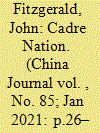

|
|
|
|
|
| Summary/Abstract |
In recent years China’s Communist Party leadership has drawn attention to the lessons of imperial history for China’s modern system of cadre (ganbu) management. The Party’s focus on history draws attention to points of continuity and discontinuity between the bureaucratic systems of the empire and the People’s Republic. This article considers the historical framework of territorial government under which officials operate and the historical trajectory of bureaucratic control over territorially based communities over the longue durée, from the imperial period through the early Republic and into the People’s Republic under Xi Jinping. By approaching the Communist Party’s cadre system as a historical outgrowth of an earlier system of territorial administration, this article brings to light assumptions dating from the late imperial period that continue to underpin the exclusive power and privileges attached to the position of officials in China, which create, in effect, a nation of cadres.
|
|
|
|
|
|
|
|
|
|
|
|
|
|
|
|
| 2 |
ID:
177960
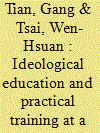

|
|
|
|
|
| Summary/Abstract |
Under Xi Jinping, the Chinese Communist Party is concentrating efforts on the cultivation of outstanding local cadres in order to improve local governance. For this purpose, it is strengthening the functions of local Party schools that offer students both political and administrative education to create a cohort of cadres who are both “red and expert.” We discuss how this is done in terms of curriculum planning, types of classes, and the student pool, using the example of County Z Party School. We find that since the national Eighteenth Party Congress, the Central Committee has reinforced its control over local Party schools to ensure that their curriculum and the methods they use to train cadres are consistent with national Party directives, as part of Beijing’s efforts to strengthen the Party’s grassroots governance.
|
|
|
|
|
|
|
|
|
|
|
|
|
|
|
|
| 3 |
ID:
177964


|
|
|
|
|
| Summary/Abstract |
A moral crisis can be personal, collective, or national. It is the perception of a critical accumulation of attitudinal changes that disrupt preexisting ethical norms and behavior. Most public perceptions of a moral crisis are not shared by all the people in a society, and the contents of moral crises also shift over time due to ongoing changes in social conditions and subjective perspectives. The differences, tensions, and conflicts underpinning recurrent public discourses over morality constitute the politics of moral crisis. This article first sketches the social conditions and moral premises in the 1970s that set the stage for radical changes in attitudinal perspectives in the post-Mao era, examines in particular the value shift toward a more individualistic morality in the 1980s, and contends that the Chinese understanding of Western individualism as a doctrine of egotism helped plant the seeds of public perceptions of moral crisis. The final section unpacks five perceived types of moral crises and points out the politics in each, highlighting the centrally important role of the Party-state in shaping China’s moral landscape. An examination of these moral crises provides a unique angle to understand the complexity of social transformation and political constraints in post-Mao China.
|
|
|
|
|
|
|
|
|
|
|
|
|
|
|
|
| 4 |
ID:
177962
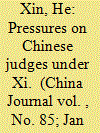

|
|
|
|
|
| Summary/Abstract |
Drawing on interviews with Chinese judges, this paper reveals the major effects of judicial reforms during the past half decade. It focuses on the ramifications of a new quota and responsibility system for judges and on the strengthening of central-government controls over the judiciary. The paper differentiates between what the Party considers to be legitimate and illegitimate influences on judges, which sheds light on recent legal developments and the role of the judiciary in Chinese governance. The article finds that illegitimate influences on courts have declined palpably, but what the Party perceives to be legitimate influences have persisted and even been reinforced. More direct, comprehensive control over judges has replaced previously fragmented, multilayered mechanisms. Despite important changes, the reforms did not lead to institutional independence of Chinese judges, nor has the stature of the courts in China’s political landscape changed.
|
|
|
|
|
|
|
|
|
|
|
|
|
|
|
|
| 5 |
ID:
177963
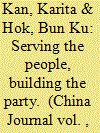

|
|
|
|
|
| Summary/Abstract |
The reform era has been associated with the waning authority of the Chinese Communist Party in urban society. While existing studies have investigated the Party’s self-reinvention through the incorporation into its ranks of professional groups and the new socioeconomic elite, much less attention has been given to how the Party has rebuilt its presence in neighborhoods among urban residents and migrant communities. Drawing on a case study in Kunming, this article argues that the Party has sought to deepen its territorial reach and regain political relevance by emphasizing welfare provision and service delivery at the grassroots. The rise of service-centered Party-building has seen increased co-optation of previously independent social organizations as “partners” and “collaborators” in service provision. Enrolling NGOs enables the Party to both revamp its image as a paternalistic redistributor and regain its ability to mobilize the masses through appropriating the vocabulary of participation and volunteerism that social organizations espouse. If in co-opting the professional and business elite the Party has successfully fused Party authority with market power, at the urban grassroots it has appropriated social forces to reestablish its presence and bolster its legitimacy, with important implications for the autonomy and professionalism of NGOs.
|
|
|
|
|
|
|
|
|
|
|
|
|
|
|
|
| 6 |
ID:
177965
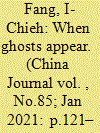

|
|
|
|
|
| Summary/Abstract |
This article discusses the haunting of a factory in Shenzhen, China. The haunting coincided with the 2008 global financial crisis that resulted in a decline in factory orders, leaving the workers, mostly migrants from the countryside, idle. With the appearance of ghosts, the workers found a cultural language that indirectly expressed their anxiety about future undisclosed measures to restructure the factory. In the end, the factory owner was forced to come forward to deal with the ghosts by performing a customary folk ritual. Starting from this scenario, it will be shown how claiming to see ghosts constitutes a political act and reveals practices within a modern factory that engage in a “moral economy” mutuality between management and workers. Through this, people in the factory gained bargaining power built upon reciprocity and social debts and were able to articulate their concerns using a supernatural system of meaning. By way of the ghost panic, they created room for corrective action even in a difficult situation.
|
|
|
|
|
|
|
|
|
|
|
|
|
|
|
|
|
|
|
|
|